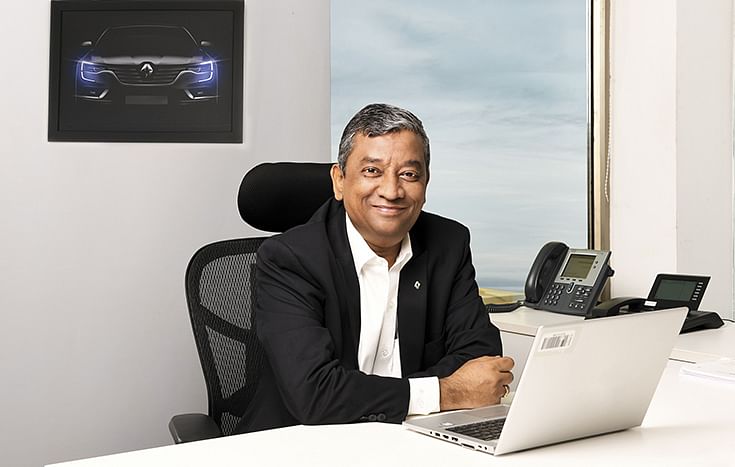Renault India plots hybrid models as part of multi-powertrain strategy
Renault, which plans to introduce its first EV in India within the next 12-18 months, is banking on turbocharged engines, including strong hybrids and plug-in hybrids, to give it more power in the competitive passenger vehiclke marketplace.
French car maker Renault is working at top speed on a plan to localise hybrid powertrains in the future for the India market. This move is part of its multi-powertrain strategy to penetrate the growing Indian passenger vehicle market.
Interestingly, Renault, which decided to exit the diesel engine market, does not foresee big potential for CNG. Therefore, Venkatram Mamillapalle, Renault India’s Managing Director, says that the company is actively looking at a wide portfolio of powertrains that will include strong and plug-in hybrids.
"We have petrol (naturally aspirated and turbocharged engines), we will have a range of EVs, and the first EV may come in by 2024 or 2025. Our products are ethanol-ready, capable of running on even E100 fuel and then we will have plug-in hybrids and strong hybrids for the Indian market."
Renault’s decision to explore a hybrid powertrain comes at a time when the passenger vehicle market leader Maruti Suzuki India, along with its global alliance partner Toyota, has received a very strong response in the marketplace for their two strong hybrid offerings, the big jump in fuel economy being the major draw. Over the past year, these two carmakers have already clocked sales of around 60,000 units of strong hybrid models; the segment has a significant waiting period of 3-6 months and currently accounts for 1.6% of the overall market.
 Venkatram Mamillapalle: "We will look to localise our plug-in hybrids, strong hybrids and EVs to ensure that products are competitive."
Venkatram Mamillapalle: "We will look to localise our plug-in hybrids, strong hybrids and EVs to ensure that products are competitive."
Applying the localisation mantra for competitive pricing
While there are no plug-in hybrid powertrains in the mainstream market, Renault is keen on understanding the potential of this niche space. This, despite the fact that a plug-in hybrid is the most expensive, albeit effective, form of a hybrid as it is both a full EV and a full ICE-powered vehicle at the same time.
What’s interesting is how Renault plans to tackle the problem and bring costs down. Mamillapalle says: "We will look to localise our plug-in hybrids, strong hybrids and EVs to ensure that products are competitive.”
Multiple engines and products on the drawing board
Renault India also plans to expand its portfolio of petrol engines. According to Mamillapalle, the company already has the BR naturally aspirated engine, the HR10, HR13 and HR 15 range of turbocharged engines. Now, the company, along with its alliance partner, is actively scouting for sourcing partners for both its electric and hybrid vehicles.
From a communication standpoint, Renault will be keenly emphasising on the power and torque of its engines. Mamillapalle points out that "communicating on cubic capacity does not give the full picture. It is about power delivery. My 1.0-litre turbo engine delivers much more power than the 1.2- litre naturally aspirated engines of rivals." So, expect Renault cars to be tabled with torque or power output figures rather than engine capacity.
While the Japanese car makers are keen on leveraging the hybrid powertrain as a bridge to greener mobility, the Indian and Korean car makers have skipped the hybrid route and have a strong focus on EVs, and cleaner petrol and diesels as an alternative.
In a PV market that grew 27% in FY2023 to a record 3.89 million units, Renault India’s sales dipped by 9.7% with sales of 78,926 units. However, having established itself as the largest European brand in the Indian market with its mass market portfolio of the Kwid, Triber and Kiger, Renault India, along with its alliance partner, is upgrading and readying itself with a portfolio of new midsize SUVs and EVs for the country as Indian buyers seek more premium cars.
Renault Nissan Automotive India, which rolls out its cars and SUVs from the 480,000 units-per-annum plant in Oragadam, Tamil Nadu, has committed over Rs 5,300 crore in the coming five years as a next phase of its investment in India and targeted production of 350,000 cars and SUVs by 2026 in India.
ALSO READ:
Renault rolls out its millionth made-in-India car
Renault India begins mobile showroom roadshow across 625 cities
RELATED ARTICLES
Cosmo First diversifies into paint protection film and ceramic coatings
The Aurangabad, Maharashtra-based packaging materials supplier is leveraging its competencies in plastic films and speci...
JSW MG Motor India confident of selling 1,000 M9 electric MPVs in first year
The 5.2-metre-long, seven-seater luxury electric MPV, which will be locally assembled at the Halol plant in Gujarat, wil...
Modern Automotives targets 25% CAGR in forged components by FY2031, diversifies into e-3Ws
The Tier-1 component supplier of forged components such as connecting rods, crankshafts, tie-rods, and fork bridges to l...






 21 Aug 2023
21 Aug 2023
 9800 Views
9800 Views





 Autocar Professional Bureau
Autocar Professional Bureau




